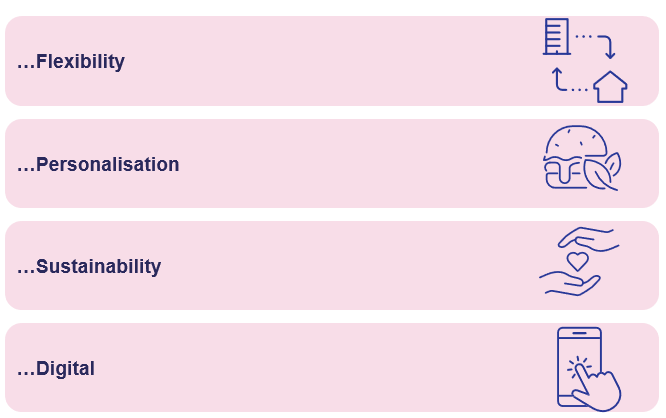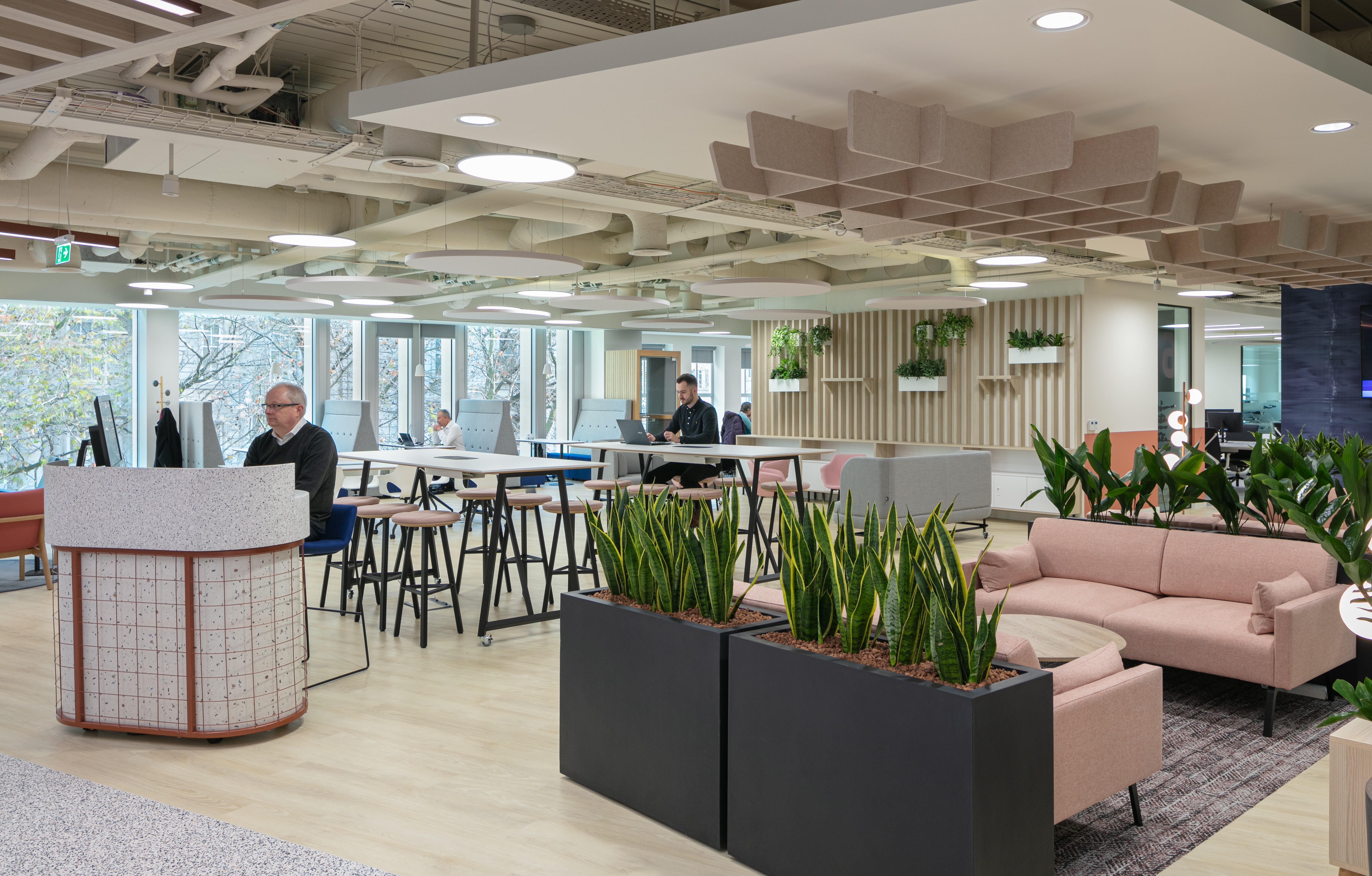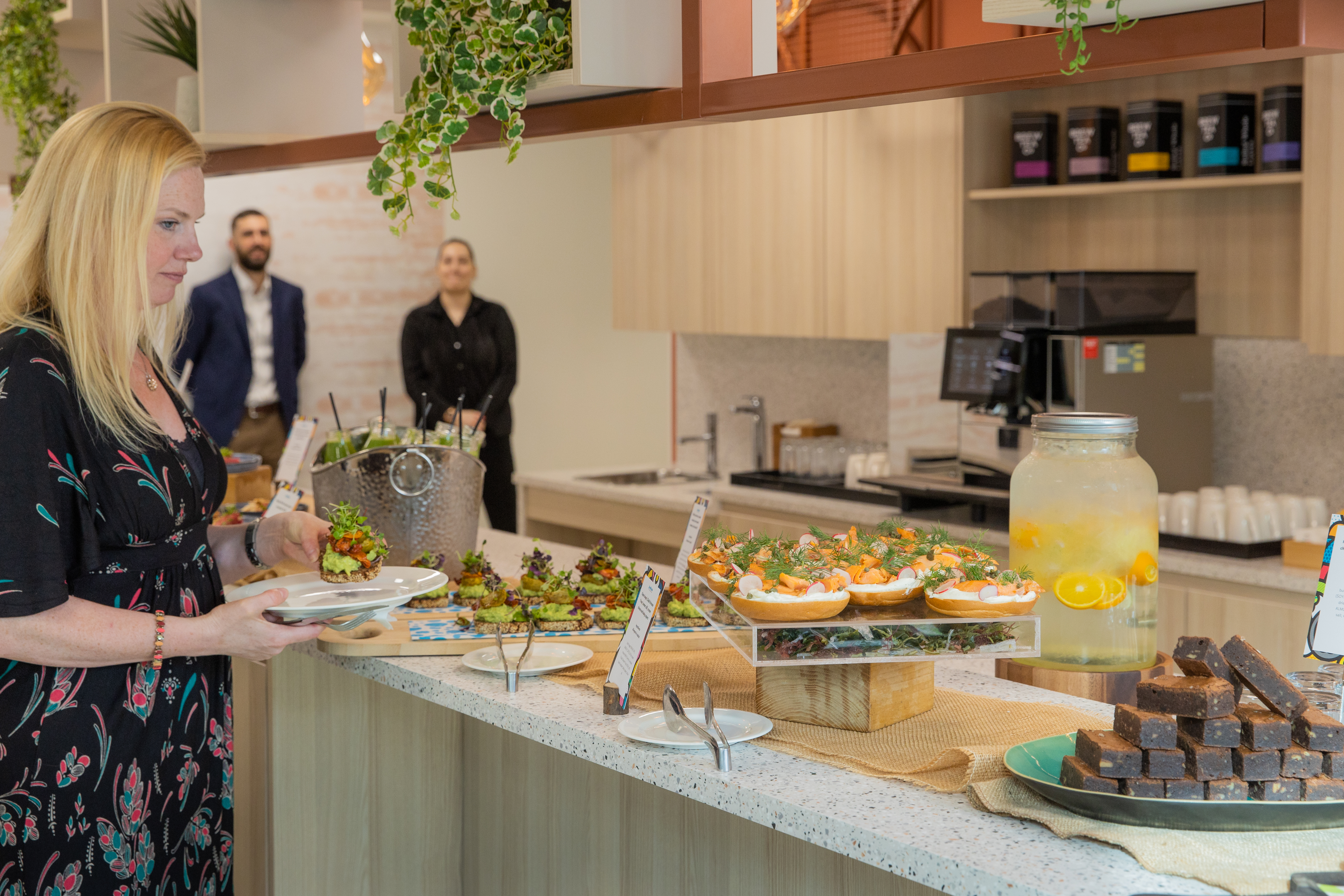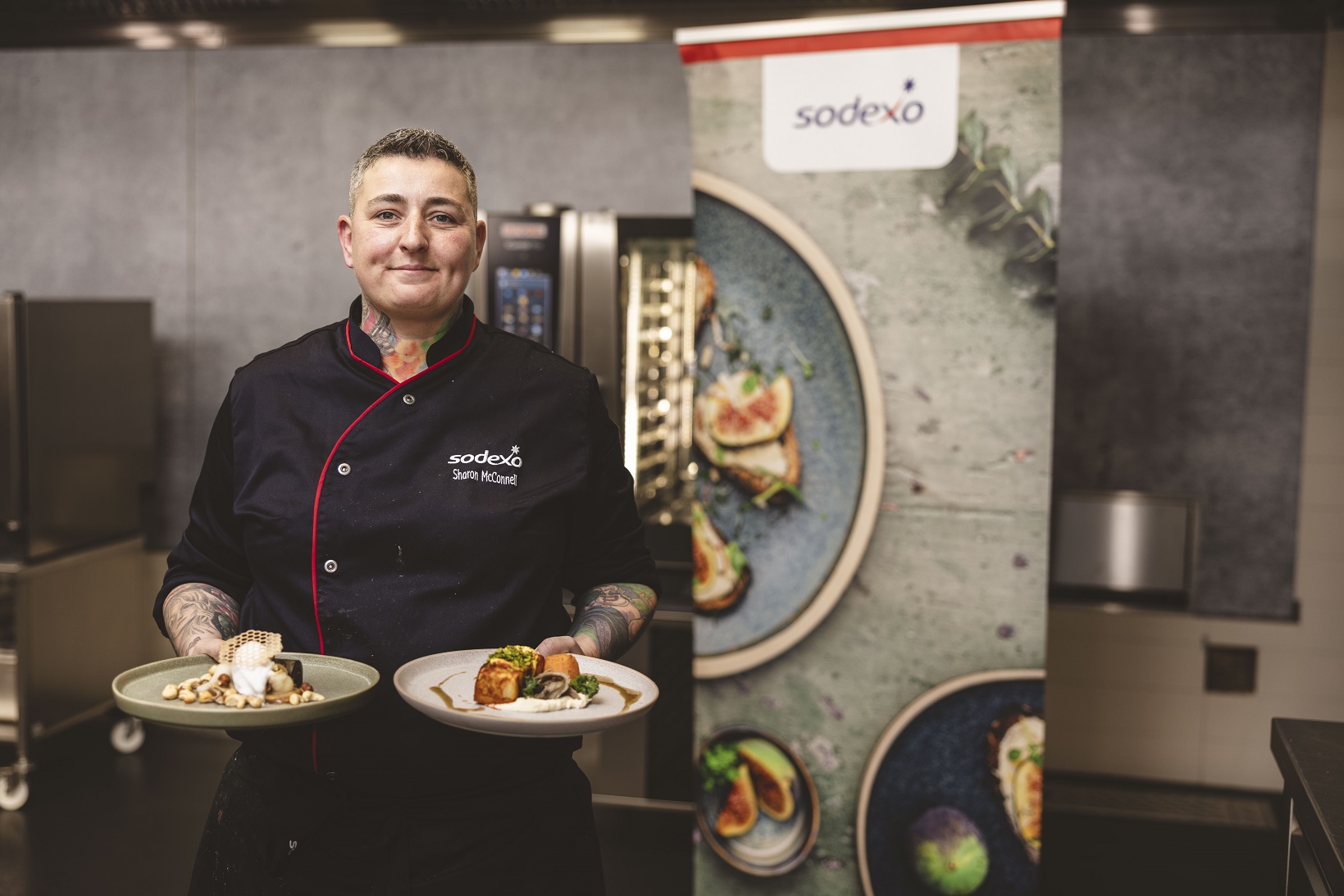Last month Julie Ennis, CEO of Sodexo Corporate Services UK&I, shared the first part of her blog post, following the delivery of a keynote speech on the future for the food sector. In this second instalment Julie explores what these mean for the UK and Ireland.
In part one, I delved into the four key trends of flexibility, personalisation, sustainability and digital, which we are seeing globally across Sodexo post Covid. These trends are prevailing closer to home too and companies can benefit from the opportunities they bring.
Initially, in the UK and Ireland, the flexibility inherent in hybrid working was “sounding the death knell for productivity”. It wasn’t really, even in places that were office-based. And manufacturing facilities, for example, were back at 100% occupancy as soon as they could be.
But although productivity didn’t take as much of a hit as people thought, the ideas economy did. Face to face meetings, chance encounters, quick catchups over coffee; all the things that sparked creativity just stopped.
Of course, many employees welcomed the flexibility of home working as an upside of the post-pandemic workplace. But they also recognise the downside of disengagement and its impact on wellbeing. When we worked with YouGov recently to survey about 3,000 people in employment, 1 in 5 were dealing with poor mental health and about the same amount were ‘quiet quitting’. When so many of the companies we work with are in a fierce competition for talent, these stats are just unsustainable.
That’s why businesses are trying to bring people back into the office as much as they can. They want to stimulate the creativity that drives innovation and also to rebuild people’s social support networks. But they probably have only three days a week to play with. We’re seeing some moves towards making it mandatory, but not for everyone and not every day. Because employers know that today’s employees are more likely to vote with their feet.
Mostly, we’re seeing businesses take a ‘workplace first’ approach. They’re competing on experience, enjoyment, wellbeing and a sense of community where before, the brand and the salary did the heavy lifting.
We’re in the food business, of course we all want people in the office. But as good as our powers of persuasion are, the stats around this workplace-first approach speak for themselves.
In 2021, we remodelled our London HQ to create a more welcoming space for when our people returned. We asked them what they missed, and what they wanted, and they said social interaction. So, we designed a space that encouraged those connections that sit at the heart of wellbeing, while also keeping those four global trends in mind.
welcoming space for when our people returned. We asked them what they missed, and what they wanted, and they said social interaction. So, we designed a space that encouraged those connections that sit at the heart of wellbeing, while also keeping those four global trends in mind.
There are ten different types of seating to suit your task or your frame of mind, from hot desks to high tables and relaxed sofas plus also booths for quiet calls, because that’s what people can do easily at home. We invested in the tech side too, so that when you did book a meeting room and connected to the screen, it was as quick and seamless as joining a Zoom call at home.
In just two weeks, and with no push and not even a hard sell, occupancy rates went up from 35% to 50% and employee satisfaction rose to 4.8 out of 5. People are more inclined to drop by to catch up with colleagues, because it’s a space that draws you in.
Good workplaces help people feel good about work. And when they feel good, they stay longer and work harder. It’s as simple as that.
Food is intrinsic to the workplace experience, and our clients are investing in that too as a way to differentiate. Food is one of the top reasons employees give for travelling in, so if you want someone to brave the commute and come to you and not your competitor, it has to be good. I don’t mean 3 Michelin star good, I mean perfect. Perfect for your employees and consumers. Flexible, because it’s available when they want it. Personalised, because they feel it hits the spot on taste, nutrition and value. Sustainable, because it reflects their values. And digital, because sometimes you want all of the above with minimal effort.
So, where do I think these trends are going in the future?
Starting with digital, it brings endless capabilities around data collection, with the potential to show companies what their employees want by tracking footfall, purchases, dwell time and how many left the building because their needs weren’t met.
Our clients don’t want us to give them that data, although we can, they want to be able to take action and evolve their workplace – and our service – to match what it’s telling them. It’s more about using that data in the right way.
Labelling is an interesting point. We’re still in the early stages of calorie labelling on meals, but it’s changing behaviour already. For the better, largely, although it’s taken the magic out of a pub roast for me.
Carbon labelling is also changing behaviour. Since we’ve deployed carbon labelling, displaying the total emissions associated with the choices consumers make every week, the numbers started to come down. That gives me hope. And I think, more than just collecting data, companies will be increasingly looking for ways to share their own as a way of boosting engagement. Particularly around sustainability,
deployed carbon labelling, displaying the total emissions associated with the choices consumers make every week, the numbers started to come down. That gives me hope. And I think, more than just collecting data, companies will be increasingly looking for ways to share their own as a way of boosting engagement. Particularly around sustainability,
Change Please is one of our coffee providers. They’re a social enterprise that uses 100% of their profits and donations to train people experiencing homelessness to become baristas. This matters to us, because it’s part of our social purpose, and it also matters to consumers. It’s a bigger part of their buying decision than it’s ever been. That means businesses will be looking more closely at the broader value – and impact – of their own supply chain.
From 2030, we’ll only work with suppliers that can publicly demonstrate meaningful progress on emission reduction. We think a lot more will follow suit.
I mentioned in the first part of this blog post that in some of our global research we saw a growing concern in the corporate world that healthy eating was getting less and less accessible to people on lower incomes. It’s a concern here in the UK&I too. These are cost-conscious times, but some companies are introducing food offers for the first time, increasing the subsidy or making them free. They’re doing this when the axe might be falling on other, less fundamental perks.
When it comes to personalisation, we’re moving beyond ease of choice and into informed choice. It’s food as medicine, chosen for your specific needs at a particular time in your life. For Gen A in particular, food is about nutrition for optimum physical performance and mental wellbeing as well as taste. The other day, I asked our global strategy director if she ever gets genuinely surprised by a stat. And she said yes, she found one only recently. That Sodexo is the biggest private sector employer of dieticians in the world. As a CEO, it obviously cheered me up no end that we’ve got a jump on this area.
The flexibility trend I’ve left until last because it’s still a major challenge for employers and the food service sector, because it’s a heady mix of ‘all-day choice’ but only on some days of the week. But we’re making it work. Like with our brand Fooditude, which serves amazing food that’s 80% vegetarian to a range of companies from a central production unit. It’s another way to do office food brilliantly without giving up space to a kitchen.
The future really comes down to balance. It’s finding ways to offer the food that people love – because it creates reasons to connect – without blowing the budget out of the water.
Memorable food makes an impact, as Instagram proves daily, so a creative food offer can support the collaboration that becomes tomorrow’s innovation.
 I’d like to end where I started in part one, with a global story. We held the final of our sustainable chef challenge in Germany in November. Our chefs from all over the world submitted ideas for a low-carbon, low-waste menu and then had to cook it live on stage ahead of the taste test. The final two couldn’t be separated, so we had joint winners: Sharon McConnell from Northern Ireland and Ricardo Machado from Brazil. It was the first time Ricardo had ever left his home country, yet here he was in Germany being judged by a German chef with three Michelin stars, that’s just some of the joy that food can bring to us.
I’d like to end where I started in part one, with a global story. We held the final of our sustainable chef challenge in Germany in November. Our chefs from all over the world submitted ideas for a low-carbon, low-waste menu and then had to cook it live on stage ahead of the taste test. The final two couldn’t be separated, so we had joint winners: Sharon McConnell from Northern Ireland and Ricardo Machado from Brazil. It was the first time Ricardo had ever left his home country, yet here he was in Germany being judged by a German chef with three Michelin stars, that’s just some of the joy that food can bring to us.
But what I loved about Sharon’s menu was that it was vegan and gluten free. She spent so much effort using every last bit of her ingredients and creating something out of this world that she thought “why limit the number of people who could enjoy this?”
Sadly, I didn’t get to eat it but what I think this illustrates is that people and innovation are an inseparable couple, so we have to feed them both.

